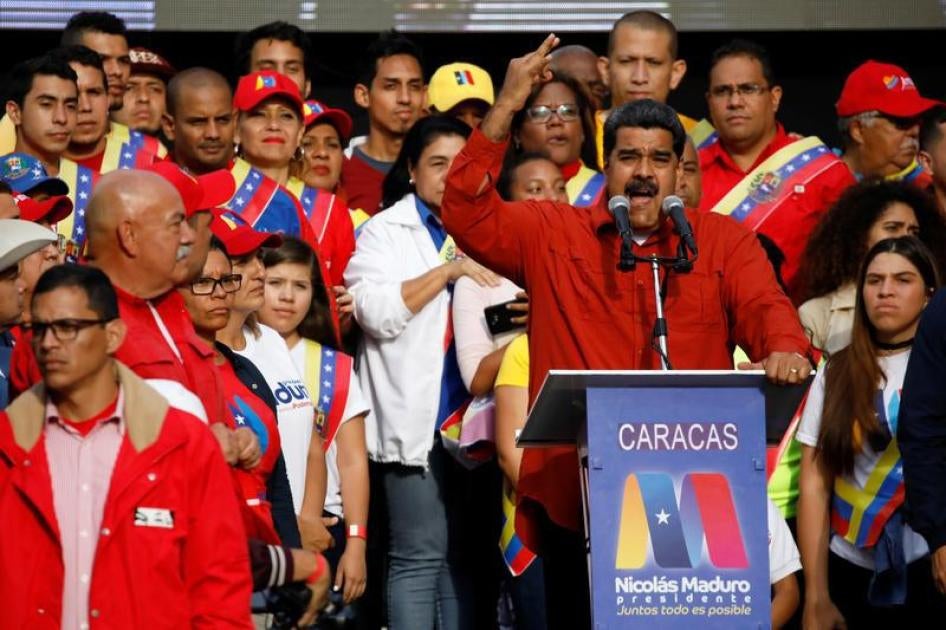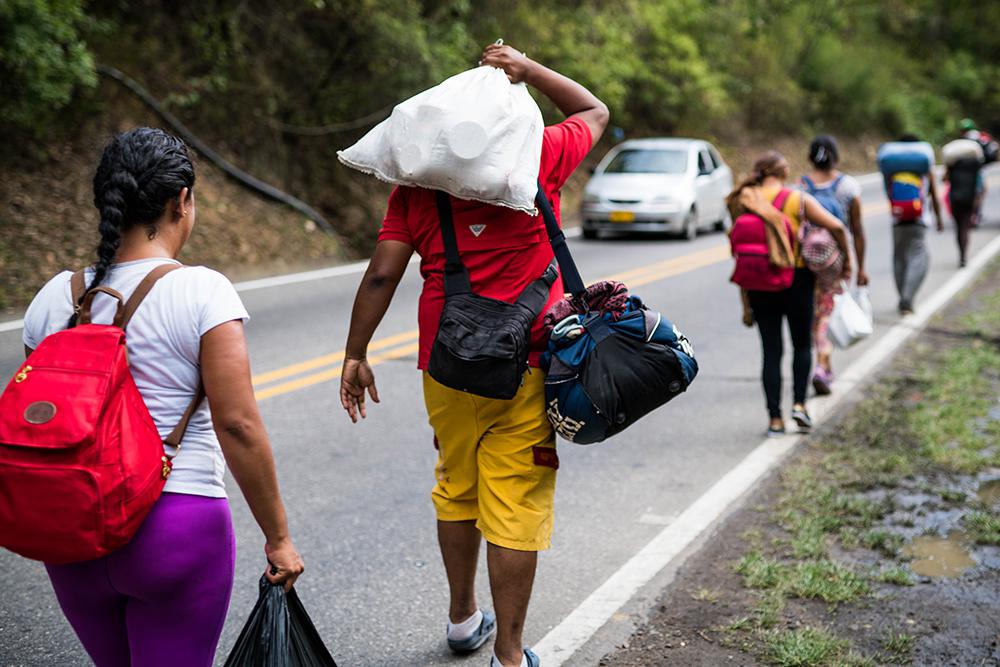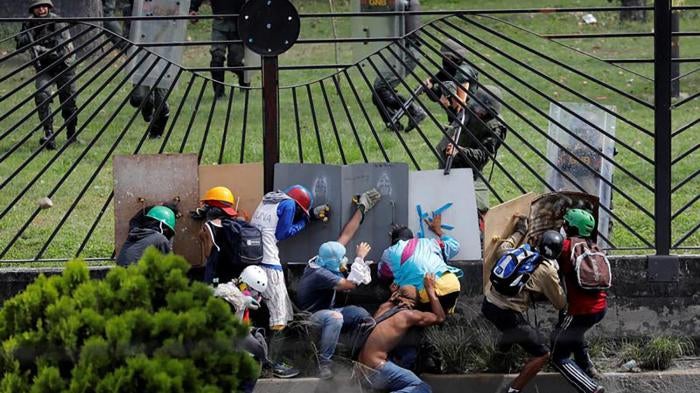Venezuela is in the grips of a humanitarian crisis fueled by Nicolás Maduro’s repression and mismanagement. The country is wracked by severe shortages of food and medicine, and more than 3.7 million Venezuelans have fled, most of them to other Latin American countries.
Human Rights Watch believes one of the best ways to pressure Venezuela’s government is through a multilateral approach led by Latin American governments. We raised the stakes on Venezuela’s government through both our high-level advocacy and a social media campaign, and today the pressure on Maduro has never been so intense.
Revealing the Depth of Venezuela’s Abuses
Human Rights Watch has long documented the Venezuelan government’s abuses. We reported on political repression, working together with local groups to cover the massive crackdown on anti-government demonstrations in 2014 and 2017. Media coverage of our work, including prior to the brutal crackdowns on the streets, helped inform the world of Maduro’s steps to undermine judicial independence, as well as the work of independent journalists and activists.
We were among the first human rights groups to expose evidence of hunger and medical shortages after we visited hospitals and food lines for a 2015 in-depth article and a 2016 report. Health workers and relief agencies told us of severe shortages of medications and supplies, including antibiotics, surgical sutures, and sterile gloves. With their help, we documented conditions contributing to rising in-hospital infections and infant and maternal mortality rates.
Working with doctors and public health specialists from the Bloomberg School of Medicine at Johns Hopkins University, we uncovered alarming trends in malnutrition in adults, including pregnant women, and increasing acute malnutrition in children. In the report, widely cited in the media, we revealed other problems like outbreaks of vaccine-preventable diseases like measles and diphtheria, spikes in infectious diseases such as malaria and tuberculosis, and rising mortality rates for all Venezuelans.
Our report not only used available information to reveal the magnitude of the crisis; it also showed that Venezuelan authorities were largely responsible for it. The government is minimizing and suppressing information about the crisis, harassing and retaliating against those who collect data or speak out about it – all while doing far too little to alleviate it. Our report called for a UN-led, full-scale humanitarian response, which we publicly asked for when presenting our findings before the UN Security Council in April 2019.
Sharpening the Focus on Venezuela’s Abuses
We met with presidents around the region and high-level officials in the Americas and Europe, leveraging our research to rally them to press Maduro to restore democratic rule. These advocacy meetings contributed to a much stronger regional response. This can be seen in the 2017 creation of the Lima Group, roughly a dozen Latin American democracies, along with Canada, that have consistently pressed Venezuelan authorities to address its ongoing political, humanitarian, human rights, and economic crisis.
This was no small feat. Traditionally, Latin American governments have been reluctant to comment on each other’s human rights records. But having proof of the dire conditions in Venezuela, together with the impact that Venezuelan emigration is having in their countries, compelled regional leaders to take action.
We also engaged Latin Americans to help pressure their leaders by launching an online campaign called #TodosConVenezuela (stand with Venezuela) in 2018. We asked people to contact some Latin American leaders and ask them to tell Maduro that “enough is enough.” The campaign, which engaged some 1.6 million people, featured superstar singer-songwriter Ricardo Montaner, an Argentinian who grew up in Venezuela.
Additionally, during last year’s protests, we compiled images from social media, vetted for accuracy, into a short video report that went viral. When the Organization of American States (OAS) held a special session of regional leaders to address Venezuela’s government crackdown, Secretary General Luis Almagro ended the gathering by showing our video report.
The Results of Our Advocacy
Thanks in part to our advocacy, for the first time some Latin American governments imposed targeted sanctions on key Venezuelan leaders implicated in the repression and corruption.
Our efforts also helped spur global condemnation on Venezuela; the first-ever resolution on the crisis that condemned Venezuela by the United Nations Human Rights Council, an effort led by Latin American governments; and targeted sanctions by the European Union, Canada, and the US.
We also shared our findings with the Office of the Prosecutor at the International Criminal Court. In February 2018, the ICC prosecutor opened a preliminary examination into allegations of abuse in Venezuela to determine if crimes against humanity have been committed.
The Work Continues
As the political struggle between Nicolás Maduro and Juan Guaidó, the National Assembly president who is challenging Maduro’s hold on the presidency, unfolds, the suffering of the Venezuelan people caused by the repression and the shortages continues. During the coming year, we will continue to document the crisis within Venezuela and regionally, ratcheting up pressure on the Venezuelan government. We will work with key international actors to send the message that those responsible for abuses will eventually be held accountable, and will continue advocating for UN leadership to implement a full-scale response to address the humanitarian emergency.














